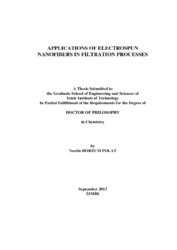Please use this identifier to cite or link to this item:
https://hdl.handle.net/11147/2954| Title: | Applications of Electrospun Nanofibers in Filtration Processe | Authors: | Horzum Polat, Nesrin | Advisors: | Elçi, Latif | Publisher: | Izmir Institute of Technology | Abstract: | Electrospinning is a simple and versatile method to fabricate ultrathin fibrous mats from a wide variety of organic and/or inorganic materials. Since it allows fabricating fiber diameter and surface/internal structures by solution and instrumental parameters, electrospun fibers provide much enhanced functionalities, which can not be obtained by bulk materials. This thesis examines the filtration, sensing and catalytical applications associated with the remarkable features of electrospun nanofibers. The systems studied are reported herein; (i) The first part of this dissertation deals with the filtration applications of electrospun nanofibrous membranes. Nano-sized chitosan fibers were utilized for sorption of Fe(III), Cu(II), Ag(I), and Cd(II) ions from aqueous solutions. The surface of chitosan fibers were further functionalized by monodisperse nano zero-valent iron (nZVI) particles for the removal of inorganic arsenic species. Sorption of radioactive U(VI) ions from aqueous systems via column sorption under continuous flow was performed using amidoximated polyacrylonitrile fibers. (ii) The second part of this dissertation presents sensing applications of ceramic fibers. Humidity sensing properties of electrospun ZnO fiber mats were investigated by quartz crystal microbalance (QCM) method and electrical measurements. Electrospinning technique was used as coating process for deposition of CeO2/ZnO and ZnO based nanofibers on the electrode of QCM. The fiber-coated QCM sensors were used for the detection of volatile organic compounds (VOCs). (iii) The last part of this dissertation describes an approach to fabricate hierarchically structured composite nanofibers. The nanostructured materials prepared by the simultaneous electrospinning of CeO2 and LiCoO2 precursors and SiO2 nanoparticles were used for the photocatalytic degradation of Rhodamine B. | Description: | Thesis (Doctoral)--İzmir Institute of Technology, Chemistry, İzmir, 2013 Includes bibliographical references (leaves: 136-161) Text in English; Abstract: Turkish and English xxi, 161 leaves |
URI: | http://hdl.handle.net/11147/2954 |
| Appears in Collections: | Phd Degree / Doktora |
Files in This Item:
| File | Description | Size | Format | |
|---|---|---|---|---|
| T001149.pdf | DoctoralThesis | 7.13 MB | Adobe PDF |  View/Open |
CORE Recommender
Page view(s)
356
checked on Apr 28, 2025
Download(s)
192
checked on Apr 28, 2025
Google ScholarTM
Check
Items in GCRIS Repository are protected by copyright, with all rights reserved, unless otherwise indicated.